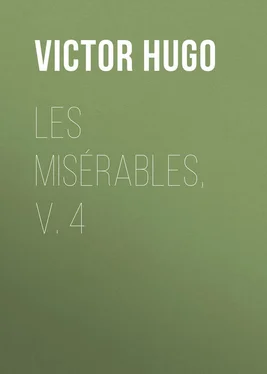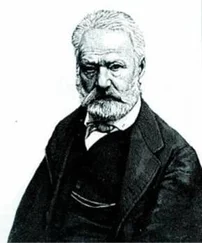Victor Hugo - Les Misérables, v. 4
Здесь есть возможность читать онлайн «Victor Hugo - Les Misérables, v. 4» — ознакомительный отрывок электронной книги совершенно бесплатно, а после прочтения отрывка купить полную версию. В некоторых случаях можно слушать аудио, скачать через торрент в формате fb2 и присутствует краткое содержание. Жанр: literature_19, foreign_antique, foreign_prose, на английском языке. Описание произведения, (предисловие) а так же отзывы посетителей доступны на портале библиотеки ЛибКат.
- Название:Les Misérables, v. 4
- Автор:
- Жанр:
- Год:неизвестен
- ISBN:нет данных
- Рейтинг книги:4 / 5. Голосов: 1
-
Избранное:Добавить в избранное
- Отзывы:
-
Ваша оценка:
- 80
- 1
- 2
- 3
- 4
- 5
Les Misérables, v. 4: краткое содержание, описание и аннотация
Предлагаем к чтению аннотацию, описание, краткое содержание или предисловие (зависит от того, что написал сам автор книги «Les Misérables, v. 4»). Если вы не нашли необходимую информацию о книге — напишите в комментариях, мы постараемся отыскать её.
Les Misérables, v. 4 — читать онлайн ознакомительный отрывок
Ниже представлен текст книги, разбитый по страницам. Система сохранения места последней прочитанной страницы, позволяет с удобством читать онлайн бесплатно книгу «Les Misérables, v. 4», без необходимости каждый раз заново искать на чём Вы остановились. Поставьте закладку, и сможете в любой момент перейти на страницу, на которой закончили чтение.
Интервал:
Закладка:
As Louis Philippe has been sternly judged by some, and perhaps harshly by others, it is very simple that a man, himself a phantom at the present day, who knew that king, should offer his testimony for him in the presence of history; this testimony, whatever its value may be, is evidently, and before all, disinterested. An epitaph written by a dead man is sincere; one shadow may console another shadow, for sharing the same darkness gives the right to praise, and there is no fear that it will ever be said of two tombs in exile, – this man flattered the other.
CHAPTER IV
CRACKS IN THE FOUNDATION
At this moment, when the drama we are recounting is about to enter one of those tragic clouds which cover the beginning of the reign of Louis Philippe, it is quite necessary that this book should give an explanation about that king. Louis Philippe had entered upon the royal authority without violence or direct action on his part, through a revolutionary change of wind, which was evidently very distinct from the real object of the revolution, but in which he, the Duc d'Orléans, had no personal initiative. He was born a prince, and believed himself elected king; he had not given himself these functions, nor had he taken them; they were offered to him and he accepted, convinced – wrongly as we think, but still convinced – that the offer was in accordance with right, and the acceptance in harmony with duty. Hence came an honest possession, and we say in all conscience that, as Louis Philippe was honest in the possession, and democracy honest in its attack, the amount of terror disengaged from social struggles cannot be laid either on the king or the democracy. A collision of principles resembles a collision of elements; ocean defends the water and the hurricane the air; the king defends royalty, democracy defends the people; the relative, which is monarchy, resists the absolute, which is the republic; society bleeds from this conflict, but what is its suffering to-day will be its salvation at a later date; and in any case those who struggle must not be blamed, for one party must be mistaken. Right does not stand, like the Colossus of Rhodes, on two shores at once, with one foot in the republic, the other in royalty, but is indivisible, and entirely on one side; those who are mistaken are honestly mistaken, and a blind man is no more a culprit than a Vendean is a brigand. We must, therefore, only impute these formidable collisions to the fatality of things, and, whatever these tempests may be, human irresponsibility is mixed up with them.
Let us finish our statement: The Government of 1830 had a hard life of it from the beginning, and born yesterday it was obliged to combat to-day. Scarce installed, it felt everywhere the vague movements of faction beneath the foundation of July, which had so recently been laid, and was still anything but solid. Resistance sprang up on the morrow, and might, perhaps, have been born on the day before, and from month to month the hostility increased, and instead of being dull became patent. The revolution of July, frowned upon by kings out of France, was diversely interpreted in France. God imparts to men His will visible in events, an obscure text written in a mysterious language. Men at once make themselves translations of it, – hasty, incorrect translations, full of errors, gaps, and misunderstandings. Very few minds comprehend the divine language; the more sagacious, the calmer, and the more profound decipher slowly, and when they arrive with their version, the work has been done long before; there are already twenty translations offered for sale. From each translation springs a party, and from each misunderstanding a failure, and each party believes that it has the only true text, and each faction believes that it possesses the light. Often enough power itself is a faction, and there are in revolutions men who swim against the current; they are the old parties. As revolutions issue from the right to revolt, the old parties that cling to heirdom by grace of God fancy that they have a right to revolt against them; but this is an error, for in revolutions the rebel is not the people but the king. Revolution is precisely the contrary of revolt; every revolution, being a normal accomplishment, contains its legitimacy within itself, which false revolutionists sometimes dishonor, but which endures even when sullied, and survives even when bleeding. Revolutions issue, not from an accident, but a necessity; for they are a return from the factitious to the real, and they take place because they must take place.
The old legitimist parties did not the less assail the revolution of 1830 with all the violence which springs from false reasoning. Errors are excellent projectiles, and they skilfully struck it at the spot where it was vulnerable, – the flaw in its cuirass, its want of logic, – and they attacked this revolution in its royalty. They cried to it, "Revolution, why this king?" Factions are blind men who aim accurately. This cry the revolutionists also raised, but coming from them it was logical. What was blundering in the legitimists was clear-sightedness in the democrats; 1830 had made the people bankrupt, and indignant democracy reproached it with the deed. The establishment of July struggled between these attacks, made by the past and the future; it represented the minute contending on one side with monarchical ages, on the other with eternal right; and then, again, 1830, no longer a revolution, and becoming a monarchy, was obliged to take precedence of Europe, and it was a further difficulty to maintain peace, for a harmony desired against the grain is often more onerous than a war. From this sullen conflict, ever muzzled but ever grumbling, emerged armed peace, that ruinous expedient of civilization suspecting itself. The royalty of July reared in the team of European cabinets, although Metternich would have liked to put a kicking-strap upon it. Impelled by progress in France, it impelled in its turn the slowly-moving European monarchies, and while towed, it towed too.
At home, however, pauperism, beggary, wages, education, the penal code, prostitution, the fall of woman, wealth, misery, production, consumption, division, exchange, money, capital, the rights of capital, and the rights of labor, – all these questions were multiplied above society, and formed a crushing weight. Outside of political parties, properly so called, another movement became manifest, and a philosophic fermentation responded to the democratic fermentation, and chosen minds felt troubled like the crowd, – differently, but quite as much. Thinking men meditated, while the soil, that is to say, the people, traversed by revolutionary currents, trembled beneath them with vague epileptic shocks. These thinkers, some isolated, but others assembled in families and almost in communities, stirred up social questions peacefully but deeply; they were impassive miners, who quietly hollowed their galleries beneath volcanoes, scarce disturbed by the dull commotions and the fires of which they caught a glimpse. This tranquillity was not the least beautiful spectacle of this agitated epoch, and these men left to political parties the question of rights, to trouble themselves about the question of happiness. What they wished to extract from society was the welfare of man; hence they elevated material questions, and questions about agriculture, trade, and commerce, almost to the dignity of a religion. In civilization, such as it has been constituted a little by God and a great deal by man, instincts are combined, aggregated, and amalgamated so as to form a real hard rock, by virtue of a law of dynamics which is carefully studied by social economists, those geologists of politics. These men, who grouped themselves under different appellations, but who may all be designated by the generic title of socialists, tried to pierce this rock and cause the living waters of human felicity to gush forth; their labors embraced all questions, from that of the scaffold to that of war, and they added to the rights of man as proclaimed by the French revolutions, the rights of the woman and the child.
Читать дальшеИнтервал:
Закладка:
Похожие книги на «Les Misérables, v. 4»
Представляем Вашему вниманию похожие книги на «Les Misérables, v. 4» списком для выбора. Мы отобрали схожую по названию и смыслу литературу в надежде предоставить читателям больше вариантов отыскать новые, интересные, ещё непрочитанные произведения.
Обсуждение, отзывы о книге «Les Misérables, v. 4» и просто собственные мнения читателей. Оставьте ваши комментарии, напишите, что Вы думаете о произведении, его смысле или главных героях. Укажите что конкретно понравилось, а что нет, и почему Вы так считаете.












